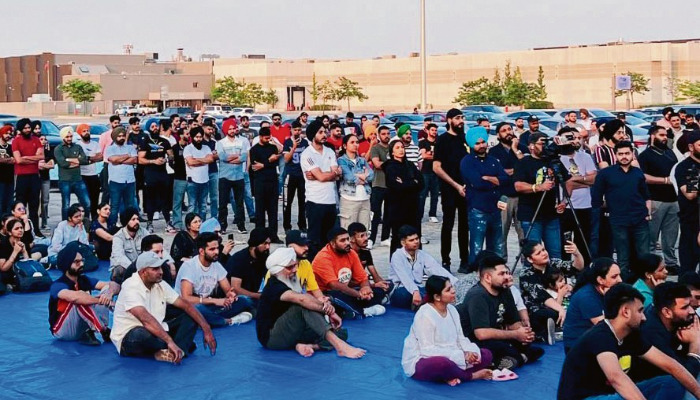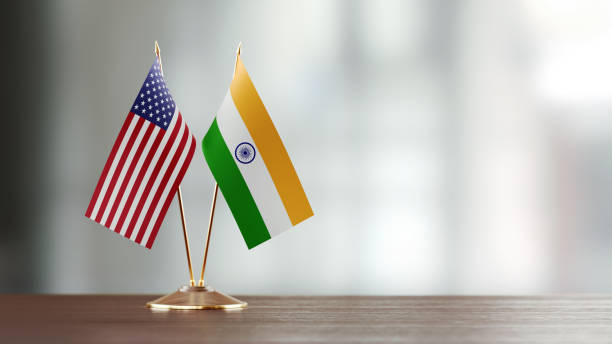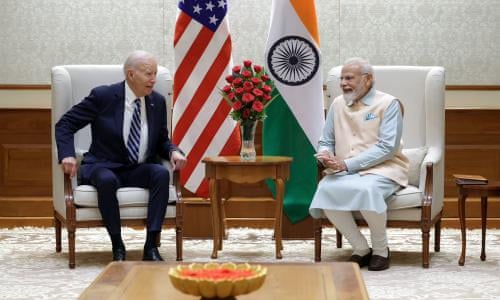Has The United States Back Stabbed India Yet Again After It ‘Cautiously’ Asked India To ‘Aid’ In The Investigation Of The Killed Khalistani Leader? Are Hindus In Canada Under Threat, And Will Ties Between India And Canada Worsen?
The escalating tensions between India and Canada have cast a shadow over diplomatic relations, sparking concerns about the safety of Indian nationals in Canada and the broader implications for international diplomacy. Recent events, including the killing of Khalistani leader Hardeep Singh Nijjar in Canada and the subsequent allegations of Indian involvement, have added complexity to an already delicate situation. Thus, the growing rift between the two nations, the advisory issued by India, Canada's travel warning for parts of India, and the United States' cautious involvement have many layers of complexity. What further problematizes the matter is Hindu-Canadians' challenges amid this diplomatic standoff. Against the backdrop is the United States' appeal to India to aid Canada in investigating the case, which is the bone of contention that has given rise to a standoff between Canada and India.

Escalating Tensions Between India and Canada Raises Concerns Over Safety
As relations between India and Canada continue to deteriorate, questions arise about the safety of Indian nationals in Canada and the potential impact on diplomatic ties.
The recent killing of Khalistani leader Hardeep Singh Nijjar in Canada has added fuel to the fire, leading to a complex web of accusations and concerns.

India Issues Advisory Amid Rising Tensions
The Ministry of External Affairs in India has issued an advisory to Indian nationals residing in Canada, urging them to exercise extreme caution.
The move comes in response to growing anti-India activities, politically-condoned hate crimes, and criminal violence in Canada.
“In view of growing anti-India activities and politically-condoned hate crimes and criminal violence in Canada, all Indian nationals there and those contemplating travel are urged to exercise utmost caution. Recently, threats have particularly targeted Indian diplomats and sections of the Indian community who oppose the anti-India agenda. Indian nationals are therefore advised to avoid travelling to regions and potential venues in Canada that have seen such incidents,” the Ministry of External Affairs.
The advisory particularly highlights threats against Indian diplomats and sections of the Indian community opposed to the anti-India agenda.
The citizens can do so through the authorities’ respective websites or the MADAD portal madad.gov.in.
Indian nationals are advised to avoid travelling to regions and venues in Canada that have witnessed such incidents.
The Ministry reassures that Indian diplomatic missions in Canada will maintain contact with Canadian authorities to ensure the safety of the Indian community.

Safety Concerns for Indian Students
Indian students in Canada are singled out for specific caution, given the deteriorating security environment.
Given the deteriorating security environment in Canada, Indian students in particular are advised to exercise extreme caution and remain vigilant,” it added.
The EAM has also advised Indian nationals and students from India in Canada to also register with the High Commission of India in Ottawa or the Consulates General of India in Toronto and Vancouver to enable authorities to connect with the Indian citizens in situations of emergencies or untoward incidents.
The Ministry of External Affairs advises them to remain vigilant and register with the High Commission of India in Ottawa or the Consulates General of India in Toronto and Vancouver to facilitate emergency communication.

Canada’s Travel Advisory for India
On the other side of the diplomatic rift, Canada has issued a travel advisory cautioning its citizens against traveling to the Union Territory of Jammu and Kashmir due to an unpredictable security situation.
“There is a threat of terrorism, militancy, civil unrest and kidnapping. This advisory excludes travelling to or within the Union Territory of Ladakh,” said Canada in its updated travel advisory for India.
This advisory further complicates the relationship between the two nations.
U.S. Concerns and Diplomatic Balancing Act
Meanwhile, The United States has expressed deep concern about allegations of potential Indian involvement in the murder of the Khalistani activist in Canada.
The White House is calling for India’s cooperation in the investigation. This development adds another layer of complexity to the diplomatic relations, especially in the wake of non-cordial talks between Indian Prime Minister Narendra Modi and his Canadian counterpart during the G20 Summit.
The White House is “deeply concerned” about accusations of potential Indian involvement in the murder of a Khalistani activist in Canada last year and wants the Asian country to cooperate in the any probe, national security spokesman John Kirby said on Wednesday.
“We are deeply concerned…We encourage India to fully cooperate,” Kirby said.
“There’s been some press speculation out there … that the United States rebuffed Canada in terms of talking about their investigation, and I just want to stress that those reports are just flatly false, untrue,” Kirby said.
Kirby on Wednesday also denied news reports that the U.S. rejected or brushed off Canada’s allegations.
The Washington Post reported on Tuesday that weeks before Trudeau’s allegations against India, Canada had asked its closest allies, including the U.S., to publicly condemn the Sikh separatist leader’s killing, but the requests were turned down.
The U.S. finds itself in a challenging position, torn between defending human rights and its geopolitical interests. Balancing its relationship with Canada, a NATO ally, and India, a strategic partner ally, will require delicate diplomacy.

Hindu-Canadians Face Threats
Amidst the diplomatic standoff, Canadian MP Chandra Arya has alleged that extremist elements are targeting and threatening Hindu-Canadians to return to India.
He has called upon Hindu-Canadians to stay calm and vigilant and report any incidents to law enforcement agencies. Arya emphasizes that a majority of Canadian Sikhs do not support the Khalistani movement.
He further said that the Khalistan movement leader is trying to “provoke” the Hindu Canadians to react and “divide the Hindu and Sikh communities” in Canada.
“Let me be clear. Vast majority of our Canadian Sikh brothers and sisters do not support the Khalistan movement. Most Sikh Canadians may not publicly condemn the Khalistan movement for several reasons, but they are deeply connected to the Hindu-Canadian community. Canadian Hindus and Sikhs are connected through family relationships and shared social and cultural ties,” he further said.
Arya stated that this “direct attack” on Hindu Canadians by the leader of the Canadian Khalistan movement is the further escalation of the recent attacks on Hindu temples and public celebration of the assassination of Hindu Prime Minister Indira Gandhi by “terrorists”.
“Canada has high moral values and we fully uphold the rule of law,” he added.
He further expressed dismay at “glorification of terrorism” and hate crime being allowed in the name of “freedom of expression”.
“I can’t understand how the glorification of terrorism or a hate crime targeting a religious group is allowed in the name of freedom of speech and expression. There would be an outrage in Canada if a white supremacist attacked any group of racialized Canadians, asking them to get out of our country. But apparently, this Khalistleader can get away with this hate crime,” he said.
Arya added that the Hindu Canadians keep a low profile are considered soft targets, and the “anti-Hindu elements” cannot digest the success of Hindu-Canadians.
“Two well-organized groups claiming to represent their faiths have been attacking Hindu-Canadian community leaders, Hindu organizations and even me. For over ten months, I have been attacked for raising a flag with our Hindu religious sacred symbol Aum on our parliament hill,” he stated.
Arya further called upon Hindu-Canadians to stay calm but vigilant.
“As Canadians, we can be proud of our Hindu faith and heritage and our impressive contribution to the socio-economic success of our country, Canada,” he added.

Impact on U.S.-India Relations
The escalating tensions between India and Canada risk impacting the U.S.’s efforts to strengthen its relationship with India as a counterweight to China. This development may force the U.S. to navigate carefully to avoid undermining its alliances with both countries.
The episode threatens to upend the U.S.’s effort to court India as a counterweight to China, which was on display at the Group of 20 summit in New Delhi earlier this month.
The U.S. and its allies had hailed Modi’s success in reaching a compromise on a joint communique, accepting softer language on Russia’s war in Ukraine to align itself more broadly with India in the battle with China for influence among major emerging economies.
The Biden administration is in a no-win situation with this latest bombshell,” said Derek Grossman, a senior defence analyst at the RAND Corporation. “If it sides with Ottawa, then New Delhi will be up in arms and, once again, question the loyalty of Washington. If it sides with New Delhi, then the U.S. is contradicting a NATO ally.”
“I expect there will certainly be back-channel discussion between the U.S. and India on how to proceed further,” he said. “With Canada being a NATO ally and India being a strategic partner ally, the U.S. will have to do the tightrope walk.”
The Last Bit, The escalating tensions between India and Canada and the apparent siding of the United States toward Canada should not come as a suprise for India.
Even as the world becomes more interconnected as economies and businesses rely and build on mutual growth and aspirations, diplomatic relations become even more complicated.
For Canada, it has ripped open the wounds of India, and in the process, it may have unfortunately opened a can of worms for itself, which will need careful handling, or it may become the new center of terrorism and, in the process, may cut itself deeply.




